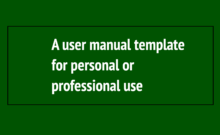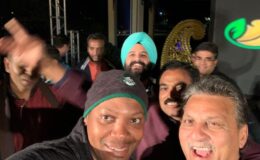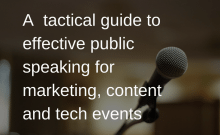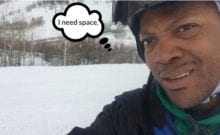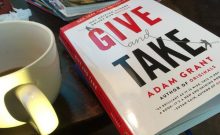In college, I studied Disruptive Innovation, the theory pioneered by legendary Harvard Business School professor Clayton Christensen to describe how new entrants to a sector initially thrive to meet the under-served parts of the market but quickly move upstream upon gaining traction. When they move upstream, however, the encounter entrenched market leaders who’ve often dominated the market for years, or even decades.
The disruption occurs when the new entrants, now with a sizable share of the market, start eating in the business of the stalwarts, who, often caught off guard, struggle to maintain their lead and many times succumb to the new kids on the block. That’s disruptive innovation and it’s impact on business. In 2010, however, I learned about another disruption, when my job was impacted in a corporate restructuring.
I had to disrupt myself, an idea made popular by Whitney Johnson, a former Wall Street analyst turned writer and author of the popular book “Disrupt Yourself: Putting the Power of Disruptive Innovation to Work.”
What does disrupt your career mean?
Unlike the popular phrase career disruption, which refers to an often sudden and traumatic ability to work, which often results from a sickness or tragedy, disrupting your career means stepping of the current path to find work that’s more meaningful for yourself, more in line with your long-term goals, and that will likely yield greater success and satisfaction. In a nutshell, it amounts to seeing an unmet need in the marketplace, and then discerning how you are uniquely qualified to fill that void. Then taking the leap to personally tackle the challenge.
For most of us, the leap, while nerve-racking at first, provokes a degree of nerve-before-seen clarity that inspires us to do our best work. In Johnson’s case, she left Wall Street to produce a TV show and write a children’s book, then later started blogging about work/life balance before she co-founded a hedge fund with Clayton Christensen.
I’ve worn many such hats, too, in the more than a decade since I disrupted myself.
The beginning of disrupting my career
Shortly before Christmas of 2010, I was part of a restructuring that resulted in magazines I headed being sold and my position eliminated. Though the memories of that fateful day are in no way painful, they are vivid, illuminating and more funny than sad. Sure, I remember the brief talk with my boss and the head of HR.
But what sticks out most is what happened immediately before and immediately after the talk: I’d just returned from the office kitchen, where I’d put away a frittata and a small bowl of fruit. When I returned to my office, my boss asked me to step into his office, where I was to receive the news. Immediately following the talk, I stood up, walked out the door of his office and took in the scene of cubicles and the people filling them. Knowing I would be a part of the group for only two weeks more did not sadden me, which struck me as odd. I was weirdly relieved.
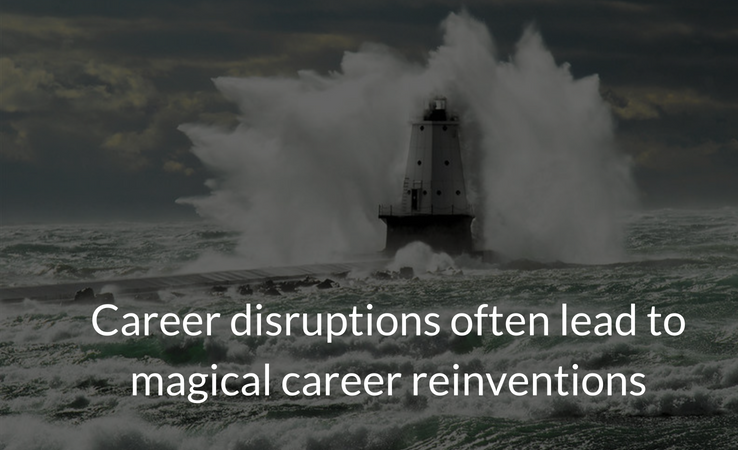
How I went on a journey to disrupting my career
I’ll start by saying three people I’ve never met — Al Ries, Dorie Clark and Whitney Johnson — played invaluable roles in helping me disrupt my career. Their writings and books were instrumental in the next steps of my professional development, helping me gain a level of clarity I’d never before experienced. To understand how, we need to go back in time a bit, which will provide some much-needed context and highlight the roles each has played in my career.
My first hard lesson: Effectively manage your career, or someone else will manage it for you.
Within an hour of receiving the news, I had two job offers; within 24 hours, the number would improve to four, all of which were viable, though not feasible. I had a strong inkling of what it was I wanted to do — become a consultant — but I was afraid to make the leap. So I allowed fielding offers to become a distraction. The calls and emails were steady.
- “Come run my company. I’ll make you part-owner and generously share any profits.”
- “I need a social media director. You’re the person for the job.”“You’re natural for PR, and we have complementary skill sets. How about becoming partners?”
- “I don’t have any money to pay you, but you’re a hell of a salesman. You could make your old salary in just three months.”
- “I need a new marketing VP. Interested in moving to [the Midwest]?”
- “You’ve done TV before … How about being a co-host of a new show we’re filming in Florida?”
I knew something was amiss when I got what I thought was a “dream offer” — the financial backing and technical support to become publisher of my own online publication. It was a role I’d envisioned as being ideal, but within 36 hours, I knew it wasn’t right. I called the head of publishing and came clean: “I’m not sure this is what I want. It wouldn’t be fair to waste your time and resources.”
Truthfully, I knew the company mainly wanted me for my name and my contacts.
Disrupting your career won’t be easy
Something gnawed at me. Constantly. It wouldn’t go away. I began to think back to those times in my professional career when I was happiest: I was learning, in a position to share what I’d learned and I was interacting with people. I was eager to consult, share my input. But I lacked the confidence to make the leap. Interestingly, the calls and emails from company owners looking for my expertise in helping to launch their products never stopped, forming the highlight of my day, though I was yet to start getting paid for the knowledge I passed on.
It was satisfying to talk to investors, wealthy business owners and VPs of marketing, walking them through design, distribution, branding, PR, advertising and overall strategy.
My new foundation: Re-encountering books, old and new
I began reaching out to friends, some of whom owned their own agencies (e.g., PR, branding, communications), asking for their honest assessment of my skill set and of my intention to move forward with consulting.
My fear: Though, I’d been a de facto “consultant” for years, while an employee of ESPN, I was a writer, researcher, knowledge-junkie first.

Al Ries, shown here with Laura Ries, his daughter and business partner.
“Figure out the one thing you are best at and enjoy most, then go after that business,” said another friend who heads a branding agency in Denver, Colo. Before he hung up, he shared some advice that would prove to be invaluable: “Be sure to read Al Ries’ Focus. It’ll help you.”
The information that changed it all, however, came from my sister-from-another-mister Janet, a dear friend who owns a communications firm in Vancouver, Washington. Sensing my trepidation at being able to garner consulting clients if my primary focus and unique value proposition (UVP) was contentcon, specifically writing, she said “Don’t worry what you call yourself. Remember, the folks who hire you typically won’t know what they need. They’ll hire you initially for content, then use you for PR, branding, product design, marketing and everything else you’re good at.”
Worthwhile reading:
- Focus: The Future Of Your Company Depends On It
- Focus Is the Difference Between Your Company Brand and Apple’s
- Narrow Your Focus
My second layer: The summer it all changed
In the summer of 2012, I committed myself to social media, in addition to reading more business-related blogs and interacting with fans and followers. Then it happened. I spotted a blog by Whitney Johnson titled “Disrupt Yourself,” piqued my interest because I credit Clayton Christensen, the father of Disruptive Innovation, with veritably “launching” my business-writing career. The blog shined a light on dramatic career change and how a non-linear path will be the norm for many of us.

Whitney Johnson
The piece made a strong case that such a path can be one that leads to great success and, most important of all, intense career satisfaction. What’s more, the blog highlighted the need to be proactive in charting your own course with regard to disrupting yourself and your career.
“[I]f as an individual you’ve reached a plateau or you suspect you won’t be happy at the top rung of the ladder you’re climbing, you should disrupt yourself for the same reasons that companies must.”
I soaked up the blog, then began scouring the web and social media for anything else I could find on Johnson, someone who herself enjoys an amazing, “disrupted” career. I found plenty to read and learn from, but the greatest impact came from watching a video where Johnson described how she disrupted her own career, highlighting for viewers how they can make similar leaps in their own careers. Her talk gave me confidence, inspiration for my own journey, steeling my resolve at consulting.
I was also thankful to Johnson for shining a light on the Christensen’s career, one that does not get nearly enough attention as it deserves.
Worthwhile reading, viewing:
- Throw Your Life A Curve
- To Get Paid What You’re Worth, Know Your Disruptive Skills
- Whitney Johnson On Disruptive Innovation
My third layer: Putting it all together
Around the same time I was reading Johnson’s “Disrupt Yourself” writings, I began to pay particular attention to another prolific writer: Dorie Clark, who was very active on Twitter. Realizing that developing a personal brand was instrumental to my success, one post she wrote really spoke to me. In it she broke down the key elements of personal brand building, including finding uncontested territory, areas where you possess an advantage that no one else can match; how your personal brand is the culmination of your product or service and your unique experience; the importance of following your passion; and the critical nature of finding and interacting with your core audience.
She had me with “Find a hole — the secret conversation…others are missing. Fill it, and you win.” Where Clark helped me immensely was in using social media to assist my brand-building efforts. Even though I’d had a Twitter account since the early days of the platform, I’d only started to consistently use the site in 2011, and even then only tepidly. As I threw myself into Clark’s writing, I saw the nuanced relationship between who I was, online and offline, who I was becoming and how the expansion of my audience would pay huge dividends in the future.

Dorie Clark
She helped me articulate how my passion, gift and career choice were all intertwined. Clark’s writing is as salient as it is insightful and compelling. And like Johnson, hers is a voice I seek out daily, as much for inspiration as for confirmation.
Worthwhile reading:
- How To Develop Your Unique Brand
- Reinventing You: Define Your Brand, Imagine Your Future
- How To Establish Yourself As An Expert
- How to Spot Trends, See the Future, and Define Your Brand in the Digital Era
- If You’re Serious About Ideas, Get Serious About Blogging
The final outcome: What disrupting your career looks like as a success story
Through reading and learning, even as I took on and worked with clients, I could hone my skills and reshape my strategy to fit the needs of my clients while also satisfying my long-term aspirations.
In short order, I was able to see astounding results:
- Through word-of-mouth only, I was able to quadruple my list of clients
- Clients from well-outside outdoor sports began contacting me for marketing, product development/marketing development and branding help
- Large companies contacted me for strategic input with regard to their branded content
- Strategic consulting, not writing or content, became the bulk of client work
Disrupt your career more than a decade later
As you might expect, Clark’s and Johnson’s writing continue to help guide my path. If you don’t already read the authors, I suggest you start. Their blogs, like their popularity, have grown exponentially through the years, and they now are read by millions of people each year. I’m still one of those people. Making the decision to disrupt my career has been one of the best choices I’ve ever made. I’m now a successful business consultant who gets to work with some of the world’s most storied brands.
How about you? Are you ready to disrupt yourself?

